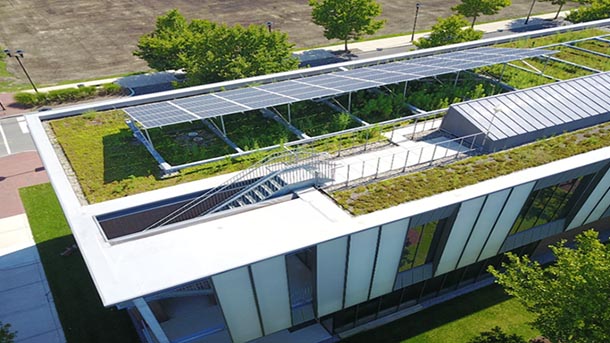
Penn State’s Department of Architectural Engineering recently developed a guide to provide introductory guidance to those in the Commonwealth of Pennsylvania who are interested in conceiving, developing, and financing ‘hybrid’ fossil fuel and renewable energy systems. IMAGE: PENN STATE
New microgrid guide to assist 'hybrid' fossil fuel and renewable energy systems
11/28/2018
PHILADELPHIA — Penn State’s Department of Architectural Engineering has announced the release of an introductory guide for those in the Commonwealth of Pennsylvania who are interested in conceiving, developing and financing ‘hybrid’ fossil fuel and renewable energy systems.
The guide, titled “CHP-Enabled Renewable Energy in Microgrids in Pennsylvania: A Guidance Document for Conceiving Feasible Systems,” is based upon work supported by the Department of Energy, Office of Energy Efficiency and Renewable Energy (EERE), under the State Energy Program through a grant from the Pennsylvania Department of Environmental Protection.
These systems can provide on-site, natural-gas-fueled electric and thermal (e.g. hot water or steam) energy generation (combined heat and power – CHP) in combination with renewable energy resources such as solar photovoltaic arrays and battery storage systems. Such systems provide an economically and environmentally attractive means to utilize Marcellus shale gas in combination with renewable energy resources to promote economic growth, with higher efficiency and lower emissions than conventional systems.
The target audience for such systems is owners of commercial and industrial buildings and properties with well-defined thermal loads, including retirement communities, multi-family buildings, hospitals, food processors and any large users of steam or hot water; commercial, institutional and industrial parks and campuses; and municipalities and rural co-op organizations.
New combinations of these well-understood technologies are making it possible to expand business cases. Multi-family residential, commercial, institutional and industrial facilities may derive value from long-term predictable costs for uninterruptable power and thermal energy for critical processes. System owners may also derive additional value from the ability to provide resilience and continuity of critical community services in the aftermath of storms and natural disasters that disrupt the regional electric grid with increasing frequency.
The guide provides the reader with a discussion of what a microgrid is, why an onsite distributed energy powered microgrid may be desired, an overview of microgrids at the building, campus and municipal scale, and a discussion of potential business models, economics and financing. A step-by-step procedure is outlined for conceiving and exploring the economic feasibility of potential CHP projects. Following the feasibility assessment process, readers will be equipped to discuss potential microgrid opportunities with community stakeholders and system developers.
It is anticipated that the guide will facilitate the exploration of potential distributed energy microgrid installations throughout Pennsylvania and will help to increase the penetration of renewable energy resources. It is also envisioned that these microgrid systems will utilize the Pennsylvania’s shale gas resources to foster economic development in an environmentally responsible manner.
The guide and accompanying spreadsheet tool can be downloaded from Penn State at the Navy Yard’s website.



